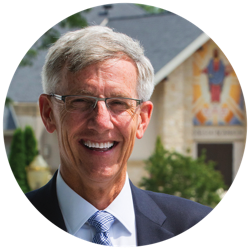Why go to college? What does a “higher education” mean to me? What is the ultimate purpose of education? What will I do with my life? What is real happiness? Should my college experience focus on personal growth or career opportunities – or both? When I look at a Catholic college or university, what does it mean to pursue a “liberal arts” course of study?
Questions like these may be on your mind. That’s good! One should be thoughtful when seeking answers to these fundamental questions. You are about to invest years of effort and significant treasure earning an undergraduate degree. Having that sense of purpose is important.
As you may know, the Roman Catholic Church invented higher education in the 11th Century. All of the original European universities were Catholic. In those medieval times, it was conceptually understood that the “artes liberals” (from the Latin, “liber,” which means free) course of study for a free man focused on the whole person rather than preparation for an ultimate economic condition. This higher-level education differed significantly from what was required of others for life on a farm, or in the trades, or as a soldier in an Army. Thus, the liberal arts included the study of language (grammar, rhetoric, and logic) as well as mathematical arts (geometry, arithmetic, music, and astronomy). For centuries, the liberal arts have provided the foundation to even higher levels of education, such as in theology, medicine, and the law.
Study of the liberal arts stands in sharp contrast to education focused on a narrow and specific livelihood. Today, we might think of those pursuits as vocational training. In these courses of study, the questions considered are often technical or specialized. The pursuit of knowledge is oriented on a specific discipline. Most often, it is without discussion or understanding of how that knowledge relates to the whole of knowledge. So you can begin to see that when uni-versity life was established it was intended to focus on the unity of knowledge rather than stovepipes of individual disciplines that have created today’s multi-versity.
As you review college offerings today, you will encounter professional as well as general education. The former is often very specialized and the latter is quite diverse. The liberal arts, with its emphasis on a broad course of study, builds upon a learning style that traces its roots back to Socrates in the days of ancient Greece. It emphasizes the development of the skills required to think critically and analyze adeptly and then to communicate effectively while making choices ethically all with an increased capacity for deep reflection. These are skills that will be applied to whatever is your life’s purpose…in the home, on the job, within your community.
Said another way, while a liberal arts education can prepare you for any career that is not the limit of the experience. Rather than a means to an end, this type of education helps you to understand what you should be doing and why it will bring you happiness. It prepares you for the habit of life-long learning in blending intellectual and ethical virtues as you apply new knowledge in changing situations. You will learn how to think about the real world in a broader context while allowing you to see what others may well miss: all that is good, and beautiful, and true.
Catholic higher education is very supportive of professional and specialized degrees, as evidenced by Catholic schools incorporating these programs ranging in enrollment size from very small colleges to large doctoral research universities, but the enterprise also recognizes that the higher level of education requires much more. The 2,000-year-old Catholic intellectual tradition that frames the liberal arts experience offers students the ability to engage in a “conversation with the world” with the unique ability to see beyond the moment, to examine hard questions objectively, and to pursue truth rather than create it. This liberal arts experience focuses on the intellectual, the physical, and the spiritual aspects of whole-person growth and development. Study after study offers empirical data that graduates grounded in a liberal arts education are more often happier, and their employers report higher levels of satisfaction than with those who are very specialized. The challenges in the workplace, in the home, and in the world are far too complex for single-dimension thinking. The liberal arts will offer you the ability to deal successfully with complexity in a rigorous way.
For over 900 years, Catholic higher education has focused on the liberal arts experience as it has always sought to protect, transmit, and generate knowledge. It is a proven education for all walks of life as its emphasis is on the development of the individual rather than seeing the individual as needing specific development for a specific role. It recognizes everyone is called to a different vocation. Thus, an educational foundation in the liberal arts prepares the whole-person for the eventual pursuit of life.
That’s why Catholic higher education places the liberal arts experience in a privileged position.

